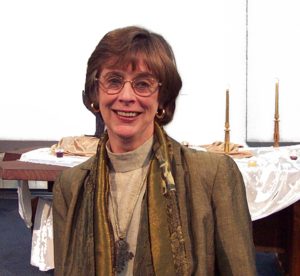The Seventeenth Sunday after Pentecost (Proper 22-C), 6 October 2019
October 6, 2019 | by Marjorie Suchocki
| Reading 1 | Reading 2 | Reading 3 | Reading 4 | Reading 1 Alt | Reading 2 Alt |
|---|---|---|---|---|---|
| Lamentations 1:1-6 | Lamentations 3:19-26 or Psalm 137 | 2 Timothy 1:1-14 | Luke 17:5-10 | Habakkuk 1:1-4; 2:1-4 | Psalm 37:1-9 |
Our focus for each Sunday this month will be on the gospel texts. Each of these selections tell stories that are well known to most parishioners. Turn that to your advantage by telling the story, not just reading it. I’ve tried to model that for you by telling each of the four stories as if to an audience. And so we begin with the strange story of Luke 17:5-10.
The context: Luke 14 through 16 offer a series of parables: guests at a wedding (“invite the poor, the crippled, the lame, and the blind…”), potential guests refusing their generous invitations, so that the servant is then bid to bring the poor, crippled, blind and lame to the feast instead; the lost sheep, the lost coin, the prodigal son, the unrighteous steward, and finally the story of the rich man and Lazarus. Each of the parables exhibits the vast generosity of God; each undercuts our pride in small generosities, and bids us to become the very image of God by practicing an enlarged generosity. Throughout, these parables underscore the reach, the inclusiveness of God’s grace.
So now in chapter 17 the apostles ask Jesus to increase their faith. Isn’t this a laudable request? Don’t we often cry out with the father of Mark 9:24, “Lord I believe! Help thou mine unbelief!” But Jesus’ response is a bit astonishing. First he tells the disciples that faith like a mustard seed can do amazing things, and then he goes on to answer the disciples’ cry for increased faith by telling them a story. Supposing you were a landowner, he says, and a slave was working your fields for you — and the word describing the worker is just that: a slave, not a servant. In that day a slave was most likely working off a debt; until he did, he was “owned” by the master. So, says Jesus, suppose this slave has been working your fields all day, and now it’s supper time and the poor slave is ready to drop from exhaustion and faint from hunger and thirst. Which of you owners will immediately ask that weary man to sit right down and eat and drink? Won’t you instead tell him to start cooking your meal, and to change into decent clothes while the meal is cooking so that he can be properly dressed while serving you your supper? After you have eaten, of course, he can get something to eat and drink himself. And certainly you as master don’t bother to thank this humble worker — he’s only doing what he should do, considering his debt; why should he be thanked? As if this story answered the disciples’ request for increased faith, Jesus then concludes the whole matter by telling the disciples they themselves must own that they, like the worker in the story, are slaves, and must recognize that whatever good they have done is only that which they ought to have done; no thanks required.
How, exactly, does this story in any way answer the direct request — almost a command! — to “Increase our faith!”? I suggest we look to the context — all those parables in the preceding chapters. Again and again, God is generous; again and again, God includes the outcast, again and again, God provides a banquet for those who are in need, or left out of society’s goods. And the disciples cry out, “Increase our faith!” What faith? In whom? The story Jesus tells them is the exact opposite of the earlier parables. God is generous; the land owner is not. God provides a banquet for the outcast; the landowner pays no attention to the thirst and hunger of his slave, telling him instead to continue working by preparing a banquet so that the master, not the slave, may eat. Doesn’t the story in Luke 17 either reflect or foreshadow the book of James — faith without works is dead? The answer to the disciples is to start emulating the generosity and inclusiveness and welcoming nature of God. Do not identify with the landowning master; identify instead with the outcast, the afflicted, the needy, and in so doing, recognize the generous nature of God, growing in becoming the very image of God by showing generosity and compassion to those in need. And as you do, you will indeed find your faith increasing.
Marjorie Hewitt Suchocki is Professor Emerita, Claremont School of Theology, Faculty Co-Director Emerita of the Center for Process Studies, Director Emerita of Process and Faith, and the founder and former Director of the Common Good International Film Festival (formerly, Whitehead International Film Festival). Among her many books are God Christ Church: A Practical Guide to Process Theology; The End of Evil: Process Eschatology in Historical Context; The Whispered Word: A Theology for Preaching; In God’s Presence: Theological Reflections on Prayer; and Through a Lens Darkly: Tracing Redemption in Film.

